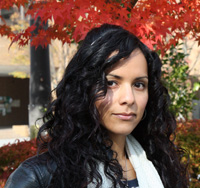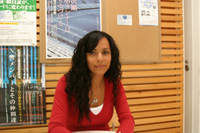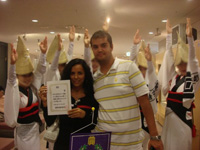We can share some things that we have in common.

Name: Marlise Sanchez Torres
Nationality: Costa Rica
Program: Teacher Training Program, the Graduate School of Education
Major: Comparative Education
Hobbies: Dancing typical and tropical music, drawing cartoons,making artcrafts and playing soccer
Thank you for allowing me to take your interview today! Let me begin by asking you what are you studying here at Hiroshima University?
I am studying Comparative Education which is my specialty as part of the teacher training program. The program lasts one and half year and there has already been one year.
I see. Were you a teacher before coming to Japan?
Yes, I have been a teacher for many years at elementary school and also I was working as a professor at the University of Costa Rica. Then, I got a MEXT scholarship to come to Japan.
How wonderful! Could you tell me about the educational system in your country?
Well, basically we are working with the Finland Model which is one of the best systems in the world.
Literacy rate in Costa Rica exceeds 97%. Of course, we are trying to improve our syllabus every year. For example, we don't have a well structured program for special activities, like sport's clubs. A special attention is being placed upon sports, arts, culture etc. What we lack is after school Sport's Clubs.
My idea is to study the curriculum in three aspects: lesson planning, special activities and moral education. Based on my observations in Japan, I hope I can be able to advice the Costa Rican Ministry of Education on appropriate measures to achieve improvements in these areas.

So, have you observed these activities in Japan?
Yes! I have visited a wonderful elementary school in Higashi-Hiroshima. At this moment, I am working with the Softball Sport Club.
Sounds interesting. Did you observe any difference between Japan and Costa Rica in terms of education?
Yes, indeed. For example, in open-days, arranged every month, parents are allowed to observe one lesson and interact with their children. In Costa Rica, such activities are less frequent and parents are simply passive observers.
Furthermore, in Japan pupil and parent participation in extracurricular activities is compulsory.
Jumping to another topic, how do you feel about Peace Education in Japan? I hear that is no army in Costa Rica, right?
That's right, we haven't been having an army since the 1940s. The current president has claimed: "We don't need an army for solving problems. We just need wise words and to discuss with people in a peaceful way". Costa Ricans, like the Japanese, are very peaceful. Although we have very different backgrounds, we come together when it comes to love for peace.
Regarding Peace Education in Japan, I believe the subject is very well provided at all levels of education. It was here that I first took a Peace Education course and that made me think about turning it into my research field in the future.
I see. What was your reason in choosing Japan?
At that time, I was searching for an opportunity to study abroad, in Germany to be precise. When I was about to submit the documents to the German embassy, I found out that in Japan there is a very well developed Comparative Education program, as both the German and Japanese embassy are located in the same building. Furthermore, I had the opportunity to develop a good comparative investigation between Costa Rica and Japan during in my Master course. Therefore, I was thrilled by the opportunity to study in Japan.
Additionally, is very rare for Costa Ricans to travel to Asian countries and I felt challenged by this chance. So, I chose Japan.
And then you chose Hiroshima University. Moving on, in Costa Rica, what do the people think about Japan?
I could say that there are two points of view. One related to the Japanese past which reveals a rich and famous cultural heritage and, the other one relates to the modern Japan in which we see very fashionist and artistic people. I have to say that in general, people in my country believe that all Japanese are able to draw anime (laugh).
I'm not good at drawing! (laugh)
I believe you! But that is the general feeling. Anyway, our young generation is very interested in "Manga Culture".
I understand. Now, I believe you told me you like drawing cartoons, right?
Yes, I have my own drawing collection. This is my sketch book but most of my drawings are back home.
(Showing the drawings) I love to draw and I think Manga is a beautiful artistic expression.

But why are you interested in cartoons?
I am not interested in the cartoon itself, but the art of the cartoon. Every line, every movement, every gesture are so alive and beautiful that gives you a delightful illusion. Some day, when I retire, I am thinking to dedicate myself to art.
Did you watch Japanese cartoon on TV in Costa Rica?
Yes, since I was a child (laugh). For example, I used to watch Mazinger Z, Atom and lately Doraemon and Dragon Ball.
And are they broadcasted in Spanish?
Of course and it's very funny. We were raised by this art and is very popular to everyone. We have many "Manga Schools" where is taught this art.
To return to your study of Moral Education, it's sometimes said that cartoons affect children in a negative way. What is your opinion about this?
I agree. Now-a-days, most of the cartoons are very aggressive and violent especially, in the case of videogames. I have seen several cases of conflict between kids because of this. Parents and educators must understand these issues and give the appropriate guidance to children.
On the other hand, certain cartoons emphasize positive values for kids. Therefore, we have to consider and focus on the good consequences coming from cartoons.
How is your life in Japan?
I love it! I have made many friends, Japanese and international students from all over the world. Japan is a school of life to me. I have met wonderful people here. I have the best host family and my friends are always supporting me in everything. On many occasions, we get together to talk, have fun, laugh. "I believe that every week we have a birthday party or two, or three".
Do you join any club activities?
I've been in a salsa dancing club. I love dancing. Latin people love tropical music like Salsa, Merengue, Cumbia and Raggae.
But I do enjoy Japanese dances as well. I went to Tokushima and learned how to dance the Awa Odori. It was an experience I will never forget.

Wow! That sounds like fun! What was your impression when you first arrived in Japan?
My first impression was・・・ Oh my God! I live in a very small town in Costa Rica. Actually, Saijo is a big city to me (laugh). Public transportation, public services are very good. In Costa Rica, for most of the services we have the "Tico-Time": it means you have a little beat more that you expect.
Sounds like fun! Did anything surprise you or did you ever get in trouble while here in Japan?
Let me see. Surprises・・・ there are many. For example, everywhere there are emergency alarms and sometimes you get confused. When you push the button by mistake, there is suddenly a bunch of people coming at you worried. Indeed for mistake I did it twice, and such a good security system surprised me. Additionally, even though we have hot-springs in Costa Rica, I was surprised by the Japanese onsen if you know what I mean.
Talking about trouble, I don't seem to get used to sit on the floor for a long time. Sometimes in schools people sit on the floor for hours and they look very comfortable. Unfortunately, I can not do it. After a few minutes, my legs get numb.
Finally, I feel that language is another trouble because I want to express myself in certain ways, but I can't find the right words: sometimes I can't even find one word. Japanese is a beautiful and interesting language, but very difficult, in particular Kanji.
How about shopping?
I think shopping is an international language for women (laugh out loud). I love shopping in Japan because of the large variety and quality. Of course, here you have to be careful with your expenses.
How do you feel about Hiroshima University, the campus and students?
The campus has all the facilities and the laboratory system is very satisfactory. In the libraries you find everything you need. The students are all friendly and the teachers are very kind. Therefore, Hiroshima University is very convenient.
Do you any advice for international students or candidates that wish to enter the university?
My advice: don't be afraid to try a culture different from yours. Here you have the chance to improve yourself and multicultural understanding. Don't be afraid to make mistake, especially when it comes to the language because you are always going someone wishing to help you with a big smile in the face.
Great advice! What are your plans after going back to Costa Rica?
Well I have many. First, try to contribute in improving the educational system. I want also to complement my work with arts. I have in mind a project for a small book for children in Japanese, Spanish and English for them to understand a little bit about certain cultural facts. And also, I want them to share some things that Latin and Asian people have in common. Here, I have learned that we have many differences but there is a very important thing called "friendship" which goes beyond languages and borders. I wish the children to appreciate the value of making friends by embracing different cultures and tolerance.
Sound like good plans. So thank you very much for talking to me today and showing me your wonderful arts.
Thank you.
Postscript
Her motivation to study here in Japan was very clear, and she has made comparative studies beween Japan and Costa Rica with great interest and cool-headed ideas. In the interview, she talked passionately about pleasant episode and her ideas with some jokes. I could recognize Japan again because of her talking. Her drawings were so beautiful and lovely! (H.O.)

After the interview

Ms. Marlise (left) and her host mother (right)


 Home
Home